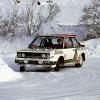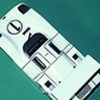Spa-Francorchamps history - name etymology
#1

Posted 25 August 2010 - 18:47
While playing an online F1 Manager Game, I was confronted with the following question:
The Belgian Formula 1 Grand Prix is held on the Circuit de Spa-Francorchamps. You probably know the word "spa" meaning a resort with therapeutic baths or mineral springs, but where does the word "Spa" in "Spa-Francorchamps" come from
a) From Special Protection Area: an area designated by the European Union in order to protect endangered species, especially birds.
b) It's abbreviation for Società per Azioni, which means limited company, like the English Ltd.. It designates that Francorchamps is a limited company.
c) People in the area used to speak a language with the word "espa" that meant "fountain".
d) The beverage maker located there owns most of the town Francorchamps.
Now, knowing the internet, I thought I could easily find the answer for it.
After a couple of hours, I've searched high and low and couldn't find an answer for this very specific question...
Can anyone help me on this?
Thanks a lot!
Advertisement
#2

Posted 25 August 2010 - 18:58
The circuit is between the towns of Spa and Francorchamps
#3

Posted 25 August 2010 - 19:00
On this site:
http://www.trabel.com/spa/spa.htm
you can find this:
Already the Romans had discovered the benefits of this watery place and the name of the city probably comes from the Latin words 'espa' (fountain) and 'sparsa' (from spargere = to bubble up).
#4

Posted 25 August 2010 - 19:07
I don't reckon you can have tried that hard.
Probably more than hard enough to gain a GCSE A* in that subject though.
#5

Posted 25 August 2010 - 19:25
Hi wise guys! (...)
Are you a Blue Meanie?
#6

Posted 30 August 2010 - 18:09
I have information about etymologies of other circuits in these three links. I'm sorry for being too lazy to translate all the entire text to you, but I think it's readable. I would also thank for correcting some possible mistakes.
http://translate.goo...j...sl=pt&tl=en
http://translate.goo.....itos-parte-2/
http://translate.goo.....itos-parte-3/
#7

Posted 30 August 2010 - 18:24
apparently translates into:Magny-Cours tem quase o dobro de tamanho, mas apenas 3% da população de Nevers e ambas estão localizadas no meião da França.
Magny-Cours has almost doubled in size, but only 3% of the population of Nevers and both are located in France's socks.
#8

Posted 30 August 2010 - 18:29
Interesting. Thank you verde. But you can always rely on Google Translate to come up with something unintentionally funny:
apparently translates into:
"Meião" would be something like "exactly in the middle of France". But it can also be "big socks", haha.
#9

Posted 31 August 2010 - 08:05
The Belgian Formula 1 Grand Prix is held on the Circuit de Spa-Francorchamps. You probably know the word "spa" meaning a resort with therapeutic baths or mineral springs, but where does the word "Spa" in "Spa-Francorchamps" come from
In fact, it would be a lot easier to say that the English word "spa" is derived from the Belgian town resort and its therapeutic baths...
#10

Posted 31 August 2010 - 08:24
#11

Posted 01 September 2010 - 15:36
#12

Posted 01 September 2010 - 16:17
The term is derived from the name of the town of Spa, Belgium, whose name is known back to Roman times, when the location was called Aquae Spadanae, perhaps related to the Latin word "spargere" meaning to scatter, sprinkle or moisten.
And the circuit is of course named for the towns of Spa and Francorchamps.
#13

Posted 01 September 2010 - 16:23
Really??I heard a legend about Russian tsar Peter I. When he learned shipbuilding in Europe he once tried a mineral water for a taste from some local source and said "Thank you" in Russian: "Spasibo". The full word was too difficult for local people and they shortened it to just "Spa" naming so the source.
I can confirm that many ship parts are named in Russian similar to the original Dutch names due to Peter's scholarship.
BTW Spa is really a healthy place. During the 1000 km we always make one lap on foot, only to stop halfway for a greasy portion flemmish fries...and a beer.
Edited by Arjan de Roos, 01 September 2010 - 16:25.
#14

Posted 01 December 2017 - 03:11
I've dusted this old thread off to ask for some wisdom on the spelling of one of the corners at the 14.1km version of Spa-Francorchamps circuit pllease.
In the 1960 Belgian GP programme it has Burneville listed, but on other occasions I've seen it spelt elsewhere with a second 'n'- so Burnenville. Are they both correct in a Reims versus Rheims sort of way?
Stephen
#15

Posted 01 December 2017 - 03:30
Don't think I've ever seen it without the second 'n'.
Edited by 2F-001, 01 December 2017 - 03:34.
#16

Posted 01 December 2017 - 03:51
http://www.malmedy.b...-bernister.html
https://fr.m.wikiped...iki/Burnenville
According to that Wiki page the name of the village in the old Walloon dialect was Burninvèye, so again the two ‘n’s.
ETA: As Tony said, it’s ‘Burnenville’ on the road signs:
https://scontent-lga...757975443_n.jpg
#17

Posted 01 December 2017 - 09:27
Hi wise guys!
While playing an online F1 Manager Game, I was confronted with the following question:
The Belgian Formula 1 Grand Prix is held on the Circuit de Spa-Francorchamps. You probably know the word "spa" meaning a resort with therapeutic baths or mineral springs, but where does the word "Spa" in "Spa-Francorchamps" come from
a) From Special Protection Area: an area designated by the European Union in order to protect endangered species, especially birds.
b) It's abbreviation for Società per Azioni, which means limited company, like the English Ltd.. It designates that Francorchamps is a limited company.
c) People in the area used to speak a language with the word "espa" that meant "fountain".
d) The beverage maker located there owns most of the town Francorchamps.
Now, knowing the internet, I thought I could easily find the answer for it.
After a couple of hours, I've searched high and low and couldn't find an answer for this very specific question...
Can anyone help me on this?
Thanks a lot!
And I thought this is general knowledge. ![]()
#18

Posted 01 December 2017 - 11:47
I reckon it’s a typo in that programme - like Tony I’ve never seen any spelling other than Burnenville. The corner takes its name from the nearby village:
Apparently referred to as the Cocoa Bends by the 2 wheeled fraternity, presumably due to the spelling being similar to Bourneville ![]()
![]()
#19

Posted 01 December 2017 - 17:23
It is interesting to consider that the circuit could not have existed before the Treaty of Versailles in 1919 as the southern part of the track was in Germany prior to that. My good friend, David Blumlein, explained in detail the creation of the track in his recent authority, "The Spa 24 Hours - A History"
It can be seen here http://www.chaters.c...hours-a-history
Advertisement
#20

Posted 01 December 2017 - 17:44
It is interesting to consider that the circuit could not have existed before the Treaty of Versailles in 1919 as the southern part of the track was in Germany prior to that.
From the first link I posted above:
The history of the village of Meiz is not only connected with the nearby motor-racing circuit at Francorchamps, it also touches on its very special geographical location and even on the history of our country. Nothing less than that! Rendezvous at the crossroads of the two roads “Chemin de la Bouvière” and “Voie Croisée” to admire the boundary stone B-P 134. So what is behind all this? This is the juncture for a little history revision…
The background is as follows: After the fall of Napoleon in 1815, the Congress of Vienna decreed the allocation of our cantons to Prussia. The boundary stone Belgium-Prussia (B-P) that you can still find here today is a silent witness to the fact that our inhabitants were once Prussian.
It was not until after the First World War that the Treaty of Versailles placed the district of Malmedy and its surrounding area into Belgian hands. The inhabitants of our villages (following a referendum!) then became Belgians… only to become Germans again in 1940 when Hitler annexed our cantons. Are you still with me…? After the Second World War, the villages became Belgian again, this time finally to remain so.
#21

Posted 01 December 2017 - 19:00
Thank you to Tony (2F-001) and Tim Murray for helping clarify the Burnenville question I raised.
The 1960 event programme circuit map will remain a curiosity as to how the name could be spelt incorrectly. It is of course illustrated and detailed by hand.
Stephen






















